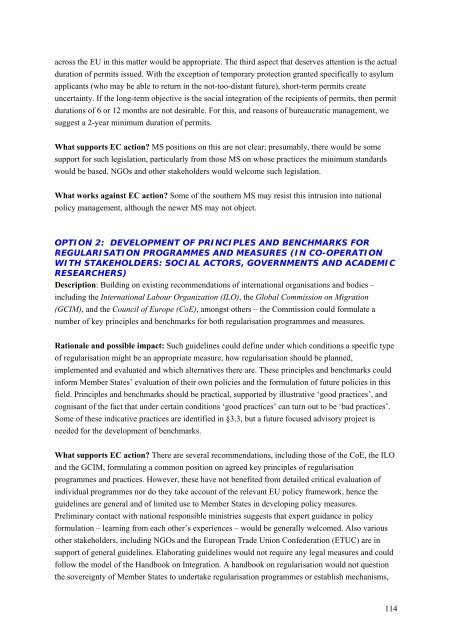REGINE Regularisations in Europe Final Report - European ...
REGINE Regularisations in Europe Final Report - European ...
REGINE Regularisations in Europe Final Report - European ...
You also want an ePaper? Increase the reach of your titles
YUMPU automatically turns print PDFs into web optimized ePapers that Google loves.
across the EU <strong>in</strong> this matter would be appropriate. The third aspect that deserves attention is the actual<br />
duration of permits issued. With the exception of temporary protection granted specifically to asylum<br />
applicants (who may be able to return <strong>in</strong> the not-too-distant future), short-term permits create<br />
uncerta<strong>in</strong>ty. If the long-term objective is the social <strong>in</strong>tegration of the recipients of permits, then permit<br />
durations of 6 or 12 months are not desirable. For this, and reasons of bureaucratic management, we<br />
suggest a 2-year m<strong>in</strong>imum duration of permits.<br />
What supports EC action? MS positions on this are not clear; presumably, there would be some<br />
support for such legislation, particularly from those MS on whose practices the m<strong>in</strong>imum standards<br />
would be based. NGOs and other stakeholders would welcome such legislation.<br />
What works aga<strong>in</strong>st EC action? Some of the southern MS may resist this <strong>in</strong>trusion <strong>in</strong>to national<br />
policy management, although the newer MS may not object.<br />
OPTION 2: DEVELOPMENT OF PRINCIPLES AND BENCHMARKS FOR<br />
REGULARISATION PROGRAMMES AND MEASURES (IN CO-OPERATION<br />
WITH STAKEHOLDERS: SOCIAL ACTORS, GOVERNMENTS AND ACADEMIC<br />
RESEARCHERS)<br />
Description: Build<strong>in</strong>g on exist<strong>in</strong>g recommendations of <strong>in</strong>ternational organisations and bodies –<br />
<strong>in</strong>clud<strong>in</strong>g the International Labour Organization (ILO), the Global Commission on Migration<br />
(GCIM), and the Council of <strong>Europe</strong> (CoE), amongst others – the Commission could formulate a<br />
number of key pr<strong>in</strong>ciples and benchmarks for both regularisation programmes and measures.<br />
Rationale and possible impact: Such guidel<strong>in</strong>es could def<strong>in</strong>e under which conditions a specific type<br />
of regularisation might be an appropriate measure, how regularisation should be planned,<br />
implemented and evaluated and which alternatives there are. These pr<strong>in</strong>ciples and benchmarks could<br />
<strong>in</strong>form Member States’ evaluation of their own policies and the formulation of future policies <strong>in</strong> this<br />
field. Pr<strong>in</strong>ciples and benchmarks should be practical, supported by illustrative ‘good practices’, and<br />
cognisant of the fact that under certa<strong>in</strong> conditions ‘good practices’ can turn out to be ‘bad practices’.<br />
Some of these <strong>in</strong>dicative practices are identified <strong>in</strong> §3.3, but a future focused advisory project is<br />
needed for the development of benchmarks.<br />
What supports EC action? There are several recommendations, <strong>in</strong>clud<strong>in</strong>g those of the CoE, the ILO<br />
and the GCIM, formulat<strong>in</strong>g a common position on agreed key pr<strong>in</strong>ciples of regularisation<br />
programmes and practices. However, these have not benefited from detailed critical evaluation of<br />
<strong>in</strong>dividual programmes nor do they take account of the relevant EU policy framework, hence the<br />
guidel<strong>in</strong>es are general and of limited use to Member States <strong>in</strong> develop<strong>in</strong>g policy measures.<br />
Prelim<strong>in</strong>ary contact with national responsible m<strong>in</strong>istries suggests that expert guidance <strong>in</strong> policy<br />
formulation – learn<strong>in</strong>g from each other’s experiences – would be generally welcomed. Also various<br />
other stakeholders, <strong>in</strong>clud<strong>in</strong>g NGOs and the <strong>Europe</strong>an Trade Union Confederation (ETUC) are <strong>in</strong><br />
support of general guidel<strong>in</strong>es. Elaborat<strong>in</strong>g guidel<strong>in</strong>es would not require any legal measures and could<br />
follow the model of the Handbook on Integration. A handbook on regularisation would not question<br />
the sovereignty of Member States to undertake regularisation programmes or establish mechanisms,<br />
114
















